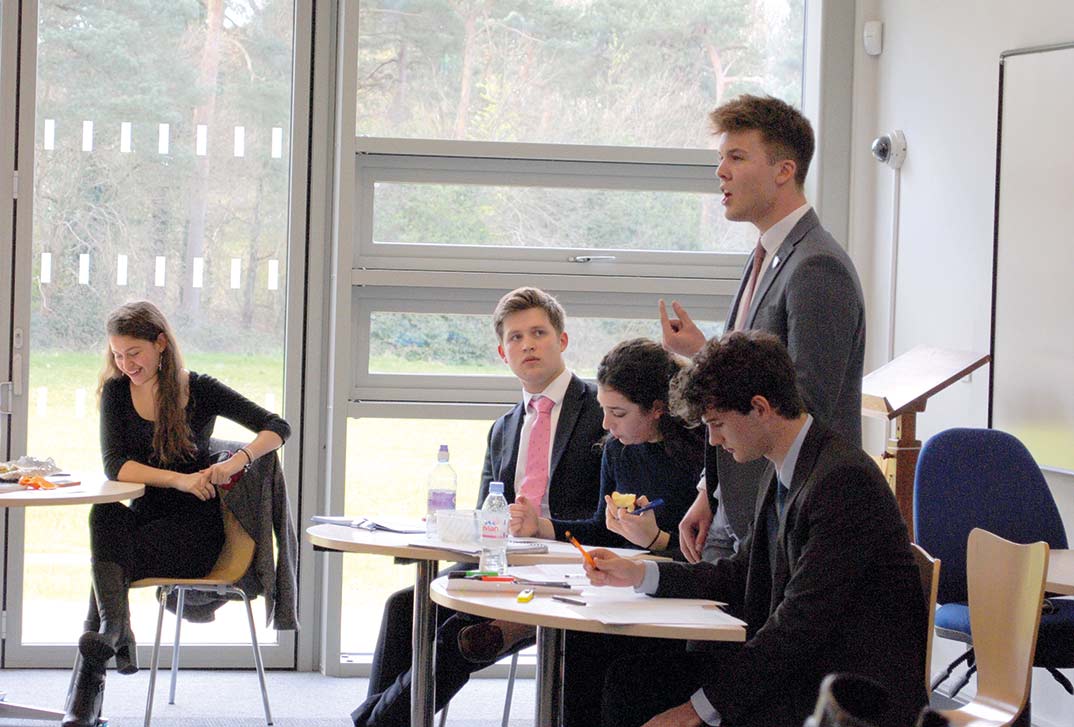In an effort to find out how the younger generation might vote in the EU referendum this newspaper worked with Bennett Memorial Sixth Formers, some of whom are eligible to vote, to help them stage their own debate. It was organised by students, run by students and the following report from student Holly Stafford is unedited.
The European Union Referendum came early at Bennett Memorial. On Tuesday (April 19) the sixth form students held a debate on whether the United Kingdom should leave or remain a member of the European Union.
The debate was conducted by Bennett’s Senior Debating Team, followed by questions from the floor and then students cast their vote.
Where do the younger generation of Tunbridge Wells stand on the issue of the UK’s membership in the EU? The outcome of this question could be said to affect the younger generation most, they are the voices and workforce of the future.
The Bennett Senior Debating Team have competed locally and regionally with great success: they won a place at the prestigious English Speaking Union School’s Mace debating competition and progressed to the South-East Regional Final.
The debate commenced with a proposition from ‘out’ speakers, highlighting the vast quantity of financial support given from the UK to the EU. A speaker said it is claimed that £350million of British money goes to Brussels each week, which is half of the English school’s budget and 60 times what is spent on the NHS cancer fund.
The opposition ‘in’ speakers responded that even though the UK invests heavily into the EU, we do benefit economically in return. They made the point that the UK put in £13billion a year to the EU, £4.5billion is directly invested back into the UK per year and the single market agreement has enabled European countries to invest £54.5million per annum in the UK. The average of this is that the UK receives £58.5 billion in return to the £13 billion it contributes.
Proposition then touched on the subject of immigration, it is estimated that there are 2,500 entering the UK every year – 2,500 people needing jobs, housing and a source of income. One speaker suggested that by having a points based immigration system this would enable the UK to ‘select the most valuable workers who offer the best skills, allowing us to gain control of our borders’.
The opposition mentioned that in order for migrants to reap any financial benefits, they must have been a UK resident for at least four years. Meaning that until then a source of income must be found and so objecting that immigration is a complete strain on the UK economy.
The floor was then opened for questions. One voter asked the opposition ‘what shall happen in regards to the UK’s research fields, if we leave the EU?’ The response was that leaving would enable the UK to negotiate and produce research of our own. It was also explained that some medical drugs developed in the research field are blocked by the EU, leaving would mean we would not be constrained by these sorts of restrictions.
Another question was put forward to the proposition ‘the EU could be said to limit the UK on making decisions as a country on what shall benefit us most, if we leave the EU wouldn’t we be freer to make better decisions for the UK?’ The proposition responded that being in the EU allows the UK to work with our neighbouring countries and that the EU is the best place to deal with any political risks.
Talking to students after they had cast their votes, one student said: “The debate presented arguments for both sides, but I’ve made up my mind for definite: vote out”.
Another student said: “The debate gave me a clearer view of the facts, however voters must vote for what will hopefully benefit them individually, and for me that is voting to remain.”
With strong arguments given from both sides, the end result was that the majority of students voted ‘in’ with 33 votes, 13 students voted ‘out’ and only six students voted ‘unsure’.
A successful debate helped define how the majority of Bennett sixth formers want to use their vote on June 23. The outcome of this day is still undefined; however the result of this vote gives a sense of how the younger generation of Tunbridge Wells stand on this monumental question.
How they voted
To remain in the EU: 33
To leave the EU: 13
Those ‘unsure’: 6








